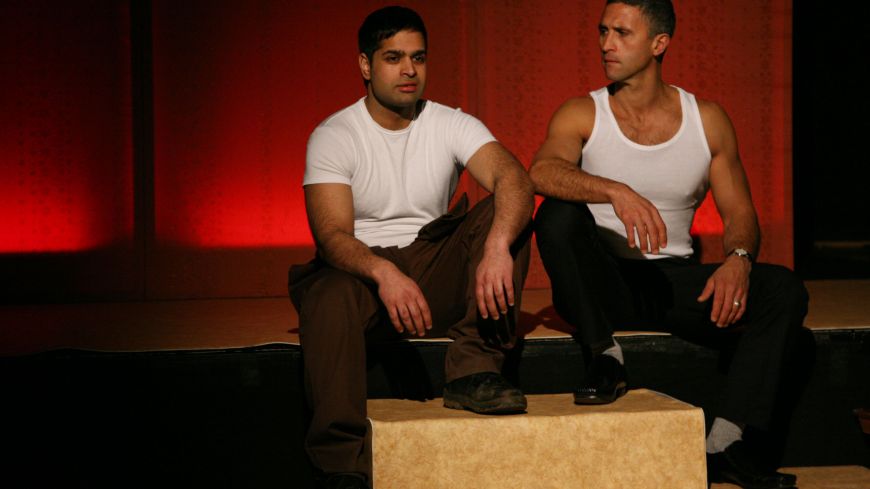
In this latest in the A Play, A Pie and A Pint series from the Arab world, we have a story from Damascene writer Abdullah Alkafri about Ayman, a middle aged psychiatrist whose homosexual son has disappeared after being thrown out by his father, and who believes that one of his patients has been involved with his son.
The frank opening scene shows a plain orange screen at one end of the stage that turns red and becomes a urinal. Ayman (Christopher Simon) has a conversation with a worker, Manar (Umar Ahmed), that quickly move to the pros and cons of male internet dating.
Already there is a question mark over Ayman’s own sexuality, although later in the play we learn of his long term ‘friendship’ with his wife’s friend, Raja (Astrid Azurdia) which only furthers the theme of hypocrisy.
The scenes shift throughout the play from Ayman’s psychiatrist’s clinic to his home where we learn that his wife is off work and drinking because of the stress of their son being missing.
Tellingly, Ayman uses “your son is queer” not "our son" to his wife and accuses her of behaving as if she is “single within a marriage”. Are these cultural references or is the former his way of disowning the young man; distancing himself from his homosexuality?
There is tension throughout rooted in the denial, but there was little sense of the story being particularly of the Arab world other than the counselling of gay men to become ‘normal’. Umar Ahmed’s performance as the taxi driver, Khaled was a convincing caricature that hinted at the arrival of some humour until the character’s deeply disturbing misogynistic views emerged, seeing any woman taking a taxi alone as an easy sexual target.
The piece felt didactic and a bit confusing. Was the male bonding at the end between Ayman and Manar the older man’s accepting of his sexuality or was it no more than his befriending a young contemporary of his late son? Was his son even dead?
The L word (lesbian) was mentioned briefly between the two women in passing but a radical look at homosexuality in a society where it has to be suppressed would be a feminine one.
Show times
15 May to 18 May 2012 at 1pm
There will also be two evening performances of Damascus Aleppo on Thursday 17 May Friday 18 May at 7pm.
Tickets £12 (includes a play, a pie and a pint of beer/ 125ml glass of wine/ regular glass of Pepsi, Diet Pepsi, Lemonade or Orange Juice/ Tea/ Filter Coffee)

